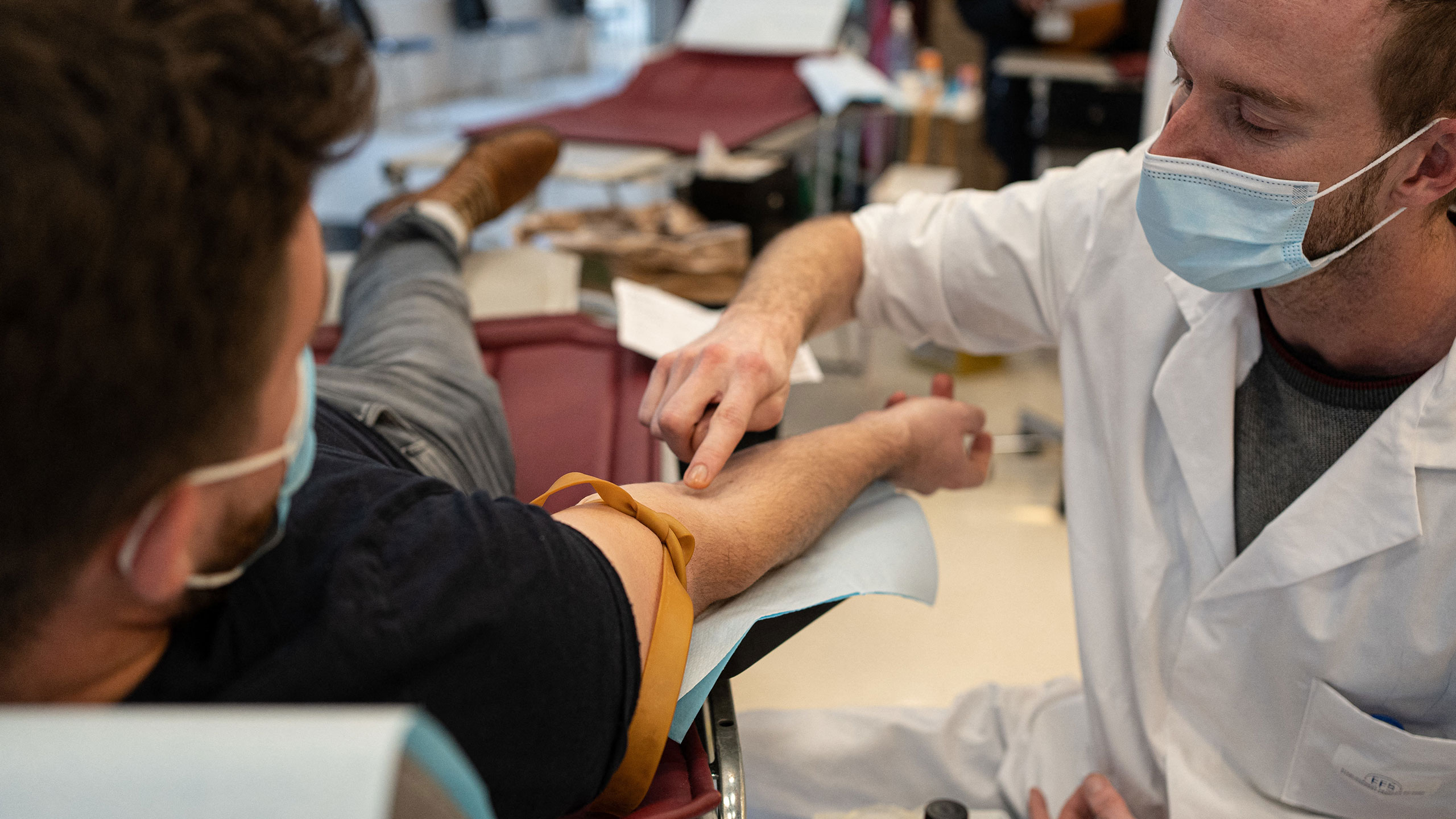France and Greece became the latest countries this week to end their discriminatory restrictions on gay and bisexual men who wish to donate blood.
French Health Minister Olivier Véran announced on Jan. 11 that the country was lifting its requirement that men who have sex with men (MSM) abstain from intercourse with a partner of the same sex for four months prior to donation. Véran said the celibacy period “was no longer justified,” largely due to advancements in HIV testing since the policy was initially enacted.
“From March 16, all French people, whatever their sexual orientation, will be able to donate blood!” he tweeted on Tuesday.
The deferral period for MSM donors dates back to the height of the AIDS crisis. In 1983, France banned queer men from donating blood for life, as little was known about the virus or how to prevent its transmission at the time. But even with that rule in place, controversy persisted: a 1991 report alleged that more than 300 hemophiliacs in France died as a result of receiving HIV through blood transfusions.
France partially lifted the ban in 2016, instead requiring that MSM donors refrain from same-sex intercourse for 12 months prior to giving blood. LGBTQ+ activists criticized the policy, claiming in a European Court of Human Rights (ECHR) complaint that 93.8 percent of gay and bisexual men would remain ineligible for donation.
Government leaders initially sent mixed signals as to whether they would heed the concerns of France’s LGBTQ+ community. Even while reducing the deferral period from one year to four months in 2019—a significant step forward—the country’s health ministry dismissed claims that giving blood is an inalienable human right. An unnamed representative instead referred to donation as a “civic gesture that is subject to safety rules,” according to the Agence France-Presse.
But last year, the lower house of France’s parliament, the National Assembly, ratified new rules requiring that MSM blood donors undergo the same screening process as heterosexual people. The changes were scheduled to go into effect this month.
In replacing the four-month deferral window, French parliamentarians laid out requirements similar to those adopted by the United Kingdom in 2021. The U.K.’s new rules allowed all individuals who have been in monogamous relationships or only had one sexual partner over the past three months to donate blood. Individuals are no longer asked about their sexual orientation during the donor screening process.
The U.K. guidelines received some blowback, however, due to a provision prohibiting persons taking pre-exposure prophylaxis (PrEP) from donating blood. The medication has been shown to be 99 percent effective at preventing transmission of HIV between sexual partners.
Even if France’s policies likewise remain imperfect, LGBTQ+ activists celebrated this week’s achievement after years of fighting.
“Imposing a four-month period of abstinence on homosexuals wishing to donate blood is totally absurd and has always been seen as a form of discrimination, especially when we know that donations are in short supply,” Matthieu Gatipon-Bachette, a spokesperson for the queer umbrella group Inter-LGBT, told French newspaper Le Parisien. “There must obviously be a health safety framework to respect, but it must not be based on the sexual orientation of the donor.”
Earlier this week, government leaders in Greece also introduced new guidelines allowing gay and bisexual men to give blood without unique constraints. Health Minister Thanos Plevris issued a decree on Jan. 10 ordering that blood centres no longer ask donors about their sexual orientation during the screening process, according to the local news agency Greek Reporter.
Prior to the announcement, Greece barred “anyone who had been in a homosexual relationship since 1977” from blood donation, one of the world’s most restrictive policies. Plevis ordered the country’s National Blood Transfusion Center to review the guidelines after he took office last September.
LGBTQ+ advocates hailed the long-overdue reforms. Irene Petropoulou, the chairperson of nongovernmental organization OLKE, said in a statement to PinkNews that the decision “was the least this government had to do.
“Of course, it is great news, and we hope the government will pay more attention to other discriminations in the healthcare system and in education,” Petropoulou told the LGBTQ+ news site. “Gay and bisexual men are free now to give blood without pretending they are straight men.”
Countries like Argentina, Chile, Germany, Israel and the Netherlands also permit MSMs to give blood without discrimination. Canada currently requires a three-month abstinence period prior to donation.


 Why you can trust Xtra
Why you can trust Xtra


